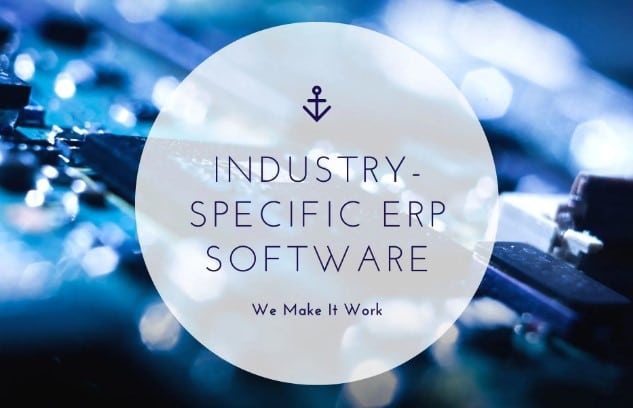Industry Specific ERP In the dynamic landscape of business technology, Enterprise Resource Planning (ERP) solutions have become a cornerstone for efficiency and success. This article aims to guide you through the nuances of ERP, covering its definition, key features, benefits, challenges, selection criteria, success stories, emerging trends, misconceptions, and a comparative analysis with generic ERP systems.
Introduction to Industry-Specific ERP

Definition and Importance
ERP refers to customized Enterprise Resource Planning solutions designed to meet the unique needs and challenges of specific industries. Its importance lies in its ability to tailor ERP functionalities to match the workflows, regulations, and demands of a particular industry.
Tailoring ERP to Unique Industry Needs
Unlike generic ERP systems, ERP is crafted to address the intricacies of a particular sector. This tailored approach ensures that businesses can optimize processes, comply with industry regulations, and achieve greater operational efficiency.
Key Features of Industry-Specific ERP
Customization for Specific Workflows
One of the primary features of ERP is its customization capabilities. It allows businesses to align the ERP system with their specific workflows, ensuring a seamless integration with existing processes.
Compliance with Industry Regulations
ERP systems are designed to adhere to the unique regulations and standards of a particular sector. This ensures that businesses remain compliant, avoiding potential legal issues and enhancing overall governance.
Benefits of Implementing Industry-Specific ERP
Improved Efficiency and Productivity
The implementation of ERP translates into improved efficiency. By streamlining processes according to industry standards, businesses can reduce redundancies and enhance productivity.
Enhanced Decision-making for Industry Challenges
ERP provides relevant and real-time data, empowering businesses to make informed decisions in response to specific challenges. This targeted approach ensures agility and adaptability.
Challenges in Adopting Industry-Specific ERP
Integration Complexities
While ERP offers tailored solutions, integrating them with existing systems can pose challenges. Businesses need to ensure a seamless integration process to avoid disruptions.
Employee Training and Adaptation
Employees accustomed to generic ERP systems may face challenges in adapting to solutions. Comprehensive training programs are crucial to ensure a smooth transition.
Choosing the Right Industry-Specific ERP
Understanding Industry Requirements
Selecting the right ERP begins with a thorough understanding of the industry’s unique requirements. This involves a detailed analysis of workflows, compliance needs, and future growth projections.
Scalability for Future Growth
A vital consideration is the scalability of the chosen ERP system. It should be capable of accommodating the business’s growth without compromising performance.
Real-world Success Stories with Industry-Specific ERP
Case Studies Showcasing Positive Outcomes
- MedTech Solutions: Achieved a 25% reduction in compliance-related issues after implementing ERP tailored for healthcare regulations.
- AutoCraft Manufacturing: Streamlined production processes, resulting in a 30% increase in efficiency using ERP customized for automotive manufacturing.
Industry-Specific Transformations and ROI
These success stories highlight how ERP solutions can lead to transformative changes in operations, ultimately contributing to a positive Return on Investment (ROI).
Emerging Trends in Industry-Specific ERP
Integration of IoT and Industry 4.0
The future of ERP involves the integration of Internet of Things (IoT) devices and Industry 4.0 principles. This enables businesses to leverage advanced technologies for enhanced connectivity and data analytics.
Cloud-based Solutions for Enhanced Accessibility
Cloud-based ERP solutions are gaining popularity, providing businesses with increased accessibility, flexibility, and cost-effectiveness.
Common Misconceptions About Industry-Specific ERP
Dispelling Myths and Clarifying Doubts
Addressing misconceptions about the complexity, cost, and adaptability of ERP is crucial for informed decision-making. Many of these myths stem from a lack of understanding about the long-term benefits.
Addressing Concerns About Cost and Complexity
While there may be initial costs and complexities associated with implementing ERP, the long-term benefits often far outweigh the initial investment, making it a strategic move for businesses.
Comparison with Generic ERP Systems
Pros and Cons of Industry-Specific vs. Generic ERP
A comparative analysis of and generic ERP systems helps businesses weigh the pros and cons, enabling them to make an informed decision based on their unique needs.
Considerations for Making the Right Choice
Factors such as industry requirements, scalability, and the need for customization should be considered when deciding between systems.
Conclusion: Revolutionizing Industries with Tailored ERP Solutions
In conclusion, ERP solutions are revolutionizing how businesses operate within specific sectors. By tailoring ERP functionalities to match industry needs, businesses can achieve unparalleled efficiency, compliance, and success. The key is to understand the unique requirements of your industry and explore tailored ERP solutions that propel your business towards excellence.